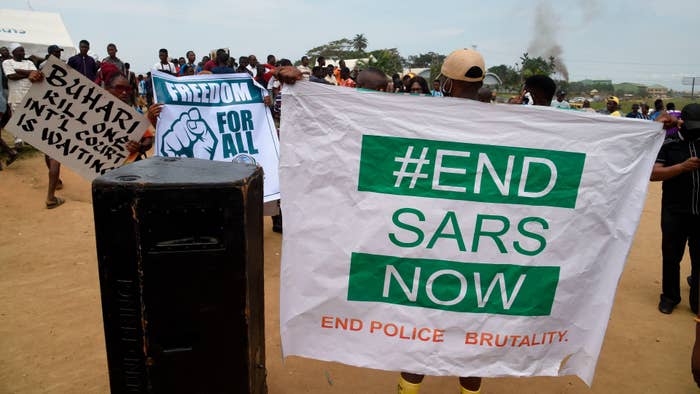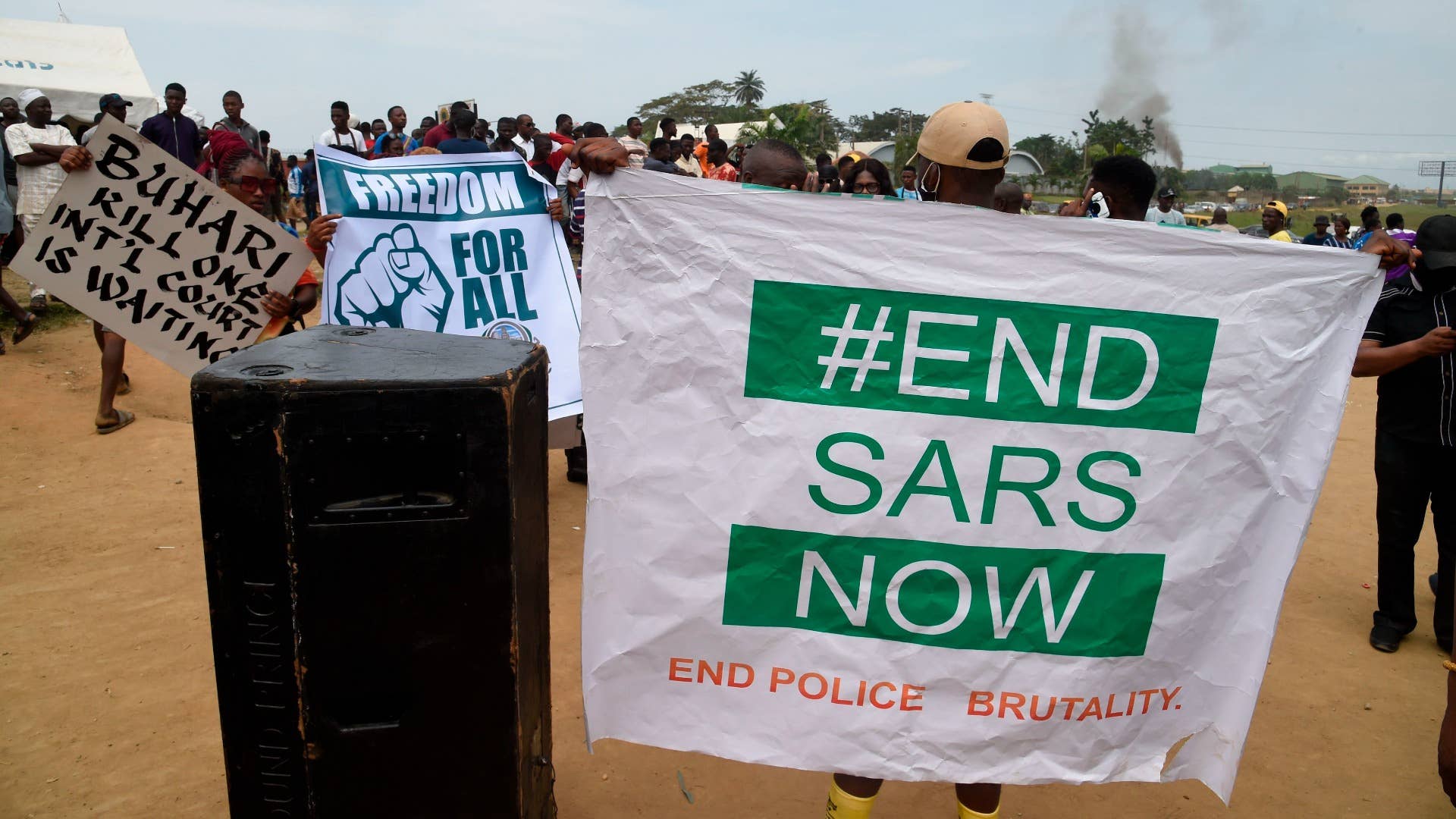
The past month has seen the #EndSARS protests in Nigeria being met with a wave of support from a growing number of artists and other public figures, including Beyoncé, who recently directed her fans to a special website set up to highlight organizations providing various types of assistance for those on the ground.
The police brutality-focused protests in the country were thrust further into the U.S. news cycle this week after reports of multiple protesters having been shot by soldiers in Lagos, Nigeria's most populous city.
Below, we break down what's happening—including a recent announcement of SARS being dissolved that protesters argue has done little to help the situation in the region—while touching on a number of ways you can show your support.
SARS is an acronym for the Special Anti-Robbery Squad, a division of Nigerian police established in 1992 whose stated purpose was to tackle "violent crimes." However, as Amnesty International and others have extensively documented over the past several months, SARS' history is rife with examples of such violence being waged against the people of Nigeria.
The current wave of protests was largely spurred by the sharing of a video allegedly showing SARS officers fatally shooting a young man in the southern Delta State, ultimately prompting the Inspector General of Police to announce on Oct. 11 that SARS had been dissolved and officers would be immediately moved to other law enforcement units.
However, the issue—as detailed in a recent Time magazine piece by Gimba Kakanda—is wholly institutional.
"SARS, and the officers working within it, have the support of the police hierarchy," Kakanda explained. "There is no penalty for any crime by the police and they are reluctant to punish one of their own. They don’t want to accept that there is rot in the system. Over the years, the police have been able to kill innocent citizens without any justice, and police brutality has become a culture here."
Per a litany of reliable social media accounts, officers in the region have a track record of often targeting young people due to what they're wearing or if they "have an iPhone or a laptop or drive a nice car." Furthermore, as has also been seen here in the U.S. during incidents of police brutality, they are said to harass and assault people who attempt to capture footage of their violence in action.
Protesters are now calling for wider reforms due to the institutional nature of police brutality's stronghold in the region.
Osai Ojigho, director of Amnesty International Nigeria, noted in a statement calling for "genuine" police reform earlier this month that Nigerians remain skeptical of any promises made so far "because the past claims of reforming SARS have turned out to be empty words."
The non-governmental human rights organization also said on Tuesday that they had received evidence from eyewitnesses (including on-the-ground footage and hospital reports) confirming that—between approximately 6:45 p.m. and 9:00 p.m. on Tuesday—Nigerian military had opened fire on thousands of peaceful protesters.
The latest on the current situation on the ground in the Lekki district of Lagos includes reports of soldiers having opened fire on peaceful protesters. And according to Amnesty, their investigative work has confirmed that Nigerian army and police forces killed "at least" 12 protesters on Tuesday at two different locations in the city.
This response of violence, as protesters and advocates worldwide have made clear, is indicative of the need for a continued push for a reform at the highest level. The latest reported shootings, Ojigho said on Wednesday, mark a clear case of "extrajudicial executions" which should be thoroughly investigated. The investigation, Ojigho added, should result in the police and military responsible for the violence being brought to trial.
Demonstrations have also been seen elsewhere around the world, with protesters seen taking to the streets in support of those affected by the heartbreaking violence seen in Nigeria. The social media impact has also been inspiringly substantial, with BBC News recently reporting that—as of Oct. 16—there were more than 3 million tweets in circulation using the #EndSARS hashtag.
Beyoncé is far from the only artist to have publicly expressed support for #EndSARS protesters.
Other creatives with wide-reaching platforms to have spoken out in recent days include Yemi Alade, Davido, Rihanna, Nicki Minaj, Chance the Rapper, Gabrielle Union, John Boyega, Burna Boy, Trevor Noah, and many more. Kanye West also called for an end to police brutality in the country, telling his Twitter followers earlier this month that he stands with "my Nigerian brothers and sisters."
And in a statement shared to his 2020 campaign site on Tuesday, Joe Biden directly urged President Buhari and the Nigerian military to immediately halt their "violent crackdown" on demonstrators.
"My heart goes out to all those who have lost a loved one in the violence," Biden, who has advised the government to begin a national conversation on how to work toward a "just and inclusive" Nigeria, said. "The United States must stand with Nigerians who are peacefully demonstrating for police reform and seeking an end to corruption in their democracy."
In addition to Feminist Coalition and Connected Development, the groups spotlighted by Beyoncé, there are a number of other organizations that could use donations or other international involvement from those who want to turn their support of protesters from afar into meaningful action.
A list of resources with donation links, available here, has been cited in recent days and features information on how to donate via a pair of GoFundMe campaigns and the Assata Collective.
Global Citizen also recommends actively working to stay informed via the End SARS website, explainer articles and videos, and more. They have also shared their own breakdown of the current situation in Nigeria, as well as advised supporters to continue using the #EndSARS hashtag (which was first made popular back in 2017).
A Change.org petition calling for an end to SARS—and, by extension, widespread police reform—has amassed more than 107,000 signatures.



